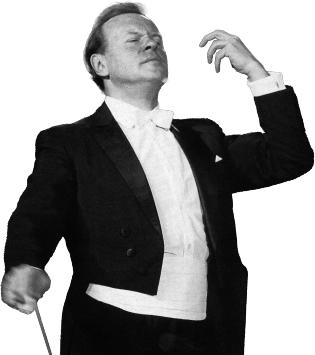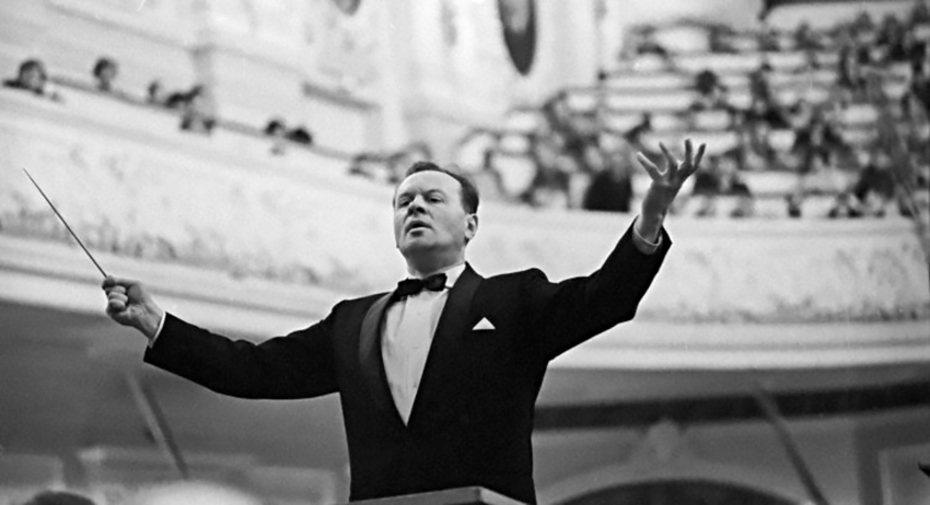On the 80th Anniversary of Evgeny Svetlanov
Cultura, No. 33 (643)
Over a long career in journalism, we had the chance to interview many outstanding figures from various professions. We were once even fortunate enough to interview a genius — Evgeny Svetlanov. A sovereign of music and its devoted servant.
… The musical season had barely begun, yet tickets for the concert “An Evening of Jewish Music,” dedicated to the 50th anniversary of the State of Israel and scheduled for April 9, 1998, at the Tchaikovsky Moscow Conservatory, were impossible to find. But how could one miss a concert by the State Symphony Orchestra of Russia under the baton of the greatest conductor of our time, Evgeny Svetlanov?!
That concert remains etched in memory for a lifetime — a true celebration, full of brightness, clarity, and power. A sense of wonder and discovery. The pleasure of hearing the orchestra, completely enthralled by its conductor, performing with flawless artistry; and of the music itself, infused with poetic inspiration, with the maestro’s fiery temperament, and with love for the creation being performed.
On that memorable evening, we were to experience yet another historic event: a conversation with Evgeny Svetlanov himself — the brilliant conductor, pianist, composer, essayist, music theorist, and critic. Evgeny Fedorovich agreed to meet with us immediately after the concert.
A graduate of the Moscow Conservatory and student of Professor Alexander Gauk (conducting), Professor Heinrich Neuhaus (piano), and Professor Yuri Shaporin (composition), Evgeny Svetlanov had already performed successfully as a pianist, written and played his own compositions, and — while still a student — served as assistant conductor of the All-Union Radio Symphony Orchestra, led by Gauk. At only 27, he was invited to join the Bolshoi Theatre as a conductor; seven years later, in 1962, he became its chief conductor. For ten years he directed the theatre’s repertoire, which included nine ballets and sixteen operas, in twelve of which he served as production conductor. Evgeny Svetlanov was the first Russian conductor among the ranks of the Greats to work at the legendary La Scala — alongside names such as Arturo Toscanini, Bruno Walter, and Herbert von Karajan.
At the age of 37, in 1965, he became Artistic Director and Chief Conductor of the USSR State Symphony Orchestra (since 1993, the State Symphony Orchestra of Russia). Over 35 years of uninterrupted leadership, he transformed it into a unique ensemble of immense scope and creative power, bringing it onto the international stage and securing its reputation as one of the greatest orchestras in the world.
… The ovations had scarcely subsided when we left the hall and headed to the service entrance, to reach the sanctum normally closed to outsiders — the inner world of the Conservatory’s musicians. The doorman, forewarned of our visit, let us into a small “anteroom,” from which the way led backstage.
Accustomed to the grand white-marble staircase, flooded with electric light and covered with a crimson carpet, up which the audience ascends solemnly from the vestibule to the foyer of the Great Hall, we exchanged surprised glances. Here, a single fly-spotted electric bulb dimly lit a narrow staircase with chipped steps and crooked handrails leading to the upper backstage rooms. Somewhere on the third floor was the maestro’s study and resting room.
In a cramped corridor, long unrenovated, with peeling walls, we were greeted by the orchestra’s administrator, Leonid Mikhailovich (his surname, unfortunately, we forgot). Apologizing on behalf of the maestro — “he is tired, you will have to wait a little” — he sat us down on worn chairs by the window. Poverty and neglect oozed from every corner — a typical picture of the late 1990s, when Russia’s so-called “cultural institutions” were barely surviving.
We welcomed the unexpected pause. Immersed in the thought of our upcoming conversation with Svetlanov himself, we realized we were still there, in the hall, in the music, in a dreamlike world of wonder and upheaval. We had not yet returned to everyday reality — and perhaps were not ready for the long-awaited encounter with the genius who had just compelled us, through his music, to empathize, to dream, to be indignant, to forgive, stirring in our souls a thousand memories — happy and bitter, proud, intimate, even shameful — memories inaccessible to outsiders.
We sat in silence, not looking at one another, afraid that someone might disturb our solitude, or that one of us might speak and break the fragile balance we both so needed.
Leonid Mikhailovich’s voice rang out, as if from nowhere:
The Maestro will see you now. — And softly added: — Please try to keep it to half an hour, and avoid tricky questions. Svetlanov is not in an easy state.
We exchanged glances, puzzled. “Tricky questions” were never our style — and certainly not with Svetlanov. But we guessed the reason for such a warning. In musical circles, rumors persisted of disagreements between the orchestra and their maestro. His uncompromising demands and artistic integrity had met with resistance, even open defiance. Experts explained that the main cause lay in the orchestra’s prolonged absence from foreign tours — the only real source of income for musicians in those years of meager salaries. Svetlanov was blamed. Tours without the maestro would bring in nothing; and he, for reasons of his own, was reluctant to pursue them. Moreover, learning of the growing discord and slander from his own pupils, Svetlanov increasingly stayed away from Moscow, devoting much of his time to the Residentie Orchestra in The Hague, where he had been chief conductor for seven years.
… Evgeny Fedorovich greeted us at the door of his study — a small, narrow room with a plain sofa covered in dark faux leather, a modest desk, and a couple of chairs. In a blue home sweatshirt, with a spotless white towel around his neck, with which he occasionally dabbed his still-flushed face, the maestro seemed so simple and approachable that our nervousness vanished at once.
Knowing our time was limited, after a brief exchange of courtesies we began. Our first question was why a Russian musician had turned to Jewish classical music.
— You’re not the first to ask me that, the maestro replied. But no one has asked why I, a Russian musician, play German, French, or Italian music. I don’t care which people it belongs to. If it’s genuine, if it’s “mine,” I play it. I loved this music — and that is what matters. Otherwise, I would never have undertaken it. Sometimes I love to listen to certain music — say, the genius Berlioz — but I never conduct it. It is not “mine.” But when something touches my heart, I cannot pass it by. That is how it was with Bloch, Falik, and Ben-Haim.
I was captivated by the Jewish melos — the oldest in the world. Listen closely, its echoes can be heard in almost every work of the Great Masters. Back in 1980, I prepared with my orchestra an “Evening of Jewish Music” from works by Prokofiev, Shostakovich, Pancho Vladigerov, and my own “Jewish Rhapsody No. 2,” as part of the traditional festival “Russian Winter.”
— In 1980?! At a time of renewed anti-Semitism in the USSR?!
— I suspected nothing of the sort (I have always been far removed from base chauvinism). I scheduled the program for the festival’s opening day. It seemed natural enough that the “Russian Winter” should open with the State Orchestra I directed. And suddenly, I felt currents swirling around me. Soon all became clear: my former Conservatory classmate, composer Alexander Flyarkovsky, then Deputy Minister of Culture, gently urged me to change the concert date. When I agreed, he even crossed himself: “God, what a weight off my shoulders!” Only then did I realize the cause. That concert, held before a packed hall, was a great success. We even added Zinovy Kompaneets’ “Jewish Rhapsody.” The music was beautiful, the audience responded warmly, and the elderly composer was overjoyed.
Three years ago, I held similar evenings in the Netherlands. They were very successful. But I longed for something new. For many years I searched for Bloch’s symphony “Israel.” I had first read about it in an encyclopedia entry on Bloch. I was burning to perform it, though I had never heard it. They say such premonitions exist — and I felt it strongly. The desire came from outside me, as if borne on mysterious currents: it was “my music.” I searched long for the score until my friend Georges Litton, father of the conductor Andrew Litton (then music director in Dallas, home to America’s finest concert hall, where I dream of conducting), finally helped me. With the treasured score in hand, we prepared it, and today my dream came true: the symphony “Israel” was performed in Moscow! A true event in the musical world. Pay attention to the finale: five voices — four female and a bass solo. It is like a rabbi’s monologue, echoed by a chorus — whether real or angelic.
I am overjoyed that this music was heard in Moscow on April 9. On April 30 it will be played in The Hague, on May 1 in Utrecht. The culmination of the festival celebrating Israel’s 50th anniversary will be a concert in Amsterdam’s famed Concertgebouw, with the Residentie Orchestra, of which I have been chief conductor for seven years. Later, I will play this music in Paris as part of a subscription series marking my 70th birthday.
This work is extremely difficult to perform. I worked on it for a long time. You see, I sometimes go through “stagnant periods.” These are times when I am alone with the score, with the composer himself, striving to understand what he wanted to say. Simply to “sound” the score is not art — at best, it is craft. But to read between the lines, between the notes, and to pass it through mind and heart — that is interpretation.
Taking advantage of Israel’s 50th anniversary, I fulfilled my dream and performed remarkable works by Jewish composers for the first time. Was it a fortunate coincidence? Perhaps. But certainly a conscious one.
At the end of our talk, without realizing it, we still asked the maestro a “tricky” question. We wondered when his next Moscow concert would be, and what he would perform.
Without replying, Evgeny Fedorovich walked to the window and stood silently, as if searching for an answer and not finding one. Suddenly he turned:
— You have met many different people… You know the most unexpected turns of life… Tell me, do you forgive the betrayal of those close to you? And without waiting for a reply, he extended his hand in farewell.
Moscow never saw another “Evening of Jewish Music.” In 1999, the maestro was forced to leave the orchestra he had led for thirty-five years. Three years later, on May 3, 2002, he was gone.
Evgeny Svetlanov left humanity an invaluable creative legacy: 150 articles, essays, and studies analyzing with depth and precision the works of the classics, his contemporaries, and fellow musicians. He left his cantata Native Fields, the rhapsody Pictures of Spain, large symphonic works such as the Romantic Ballad, the symphonic poems Daugava and Siberian Fantasy, and others, now performed worldwide. He left the operas and ballets he conducted in theatres. He left complete recordings of the symphonies of Brahms, Beethoven, Schumann, Dvořák, and many more; all the works of Tchaikovsky; and the twenty symphonies of Nikolai Myaskovsky.
And to his musicians — even to those who had failed to remain faithful to their Teacher — he bequeathed the name Svetlanov’s Musicians — an eternal passport into any of the world’s most prestigious symphony orchestras.
M. Nemirovskaya, V. Shnitser


